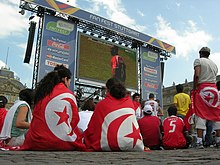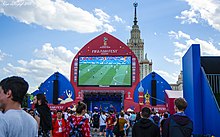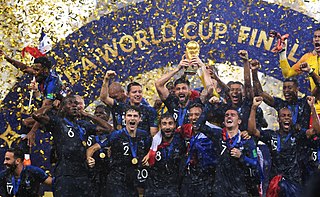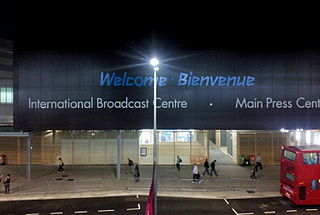History
Background
Public screenings of sports and particularly football tournaments weren't a new thing by the beginning of the 21st century. The first 1930 FIFA World Cup in Uruguay was broadcast on radio and fans gathered around receiving stations. FIFA pioneered TV broadcasts of football tournaments during the 1954 World Cup in Switzerland and people in many countries carried TVs on the streets and watched them collectively with their neighbors. [1] 1998 FIFA World Cup in France was the first one to be broadcast on giant screens in city centres, but that time the invention of massive public viewing was an anticipated effect of ticket shortage caused by variety of factors. [2]
2002, South Korea

The 2002 FIFA World Cup co-hosted by South Korea and Japan, the first World Cup to be held in Asia, surprised the world with Korea's unique culture of public viewing and street cheering. Japanese authorities considered enthusiastic fan behavior deviant, acted restrictive on the matter of public viewing and limited it to specific sites, i.e. the National Stadium in Tokyo where nearly 45 thousand people gathered to watch broadcasts of games taking place at Osaka and Sendai. [3] Korean public administration, on the contrary, tolerated public demonstration of fan excitement and supported the creation of public viewing areas (PVAs) in an urban environment where people could watch the games on so-called "big screens". [4] [5] In addition to PVAs set up by local authorities and electric bulletin boards on the buildings many local companies arranged mobile screens on trucks.
The South Korea national football team showed remarkable performance throughout the tournament and its supporters swarmed the streets and squares to collectively watch broadcasts on the screens and celebrate. The police tolerated extreme demonstrations of fan excitement and Korean media portrayed street supporters in a positive light. [6] Korean-style street cheering organized by national team's supporting group Red Devils became a world-wide impression as nearly 7 million Koreans (1 in 7 of the population) gathered at PVAs during the semi-final game between South Korea and Germany. [7] Public broadcasts and street cheering provided World Cup a different "culture of viewing" that combined experience of high-quality TV broadcast and out-of-home reception at stadium where companionship intensified the entertainment and enhanced the feelings. [8] [9]
2006, Germany

In the preparation for 2006 FIFA World Cup, FIFA and the Organizing Committee sought a way to accommodate people planning to visit the World Cup. The experience of past World Cups and public viewing was conceptualized in 4-weeks long events for football supporters to meet, board, interact, partake in cultural activities and watch all 64 games on giant video walls. Since 2004 the details on costs, logistics, safety issues, marketing and broadcast rights were jointly hammered out by FIFA and the Host Cities [10] Those public viewing events that became known under the name of Fan Fests, served an idea to provide football supporters without tickets a legitimate opportunity to partake in the World Cup. Unlike the past tournaments where ticketless fans were treated as security risks, the World Cup in Germany welcomed all football supporters thus generating a positive atmosphere even before the tournament began. Even though security planners and media were skeptical and cautious on the matter of public viewing, the skepticism was cast aside with the beginning of the World Cup. [11]
Fan Fests for the 2006 FIFA World Cup were set up in 12 Host Cities and attracted 21 million visitors throughout tournament according to German National Tourist Board (FIFA claimed there were over 18 million visitors). [1] [12] Berlin "Fanmeile" located at pedestrianized Straße des 17. Juni between Brandenburg Gate and Victory Column with 14 consecutive video walls attracted 9 million fans over the duration of World Cup with nearly 1 million supporters each German football team game. For the first time in German history an event scored more visitors than Oktoberfest. [13] Cologne Fan Fest scored 3 million visitors followed by 1.9 million in Frankfurt, 1.5 million in Stuttgart, 1.46 million in Hamburg, 1 million per Dortmund and Munich, 500 thousands per Nuremberg and Hannover, 471 thousands in Leipzig, 350 thousands in Gelsenkirchen and 205 thousands in Kaiserslautern. Those numbers exceeded all expectations and some of the Host Cities had to expand the Fan Fest areas in the middle of the World Cup. [14] The most popular Fan Fests were located in the inner city areas and the approach to keep the city centre generally "fan free" applied by the authorities of Nuremberg proved ineffective as many football supporters preferred to stay in the picturesque city centre. [11] According to surveys conducted during the 2006 FIFA World Cup at the Fan Fests at Berlin, Frankfurt and Munich 28% of visitors travelled over 100 kilometers to attend to event and up to 84% came there together with friends. Around 21% of foreigners interviewed at Fan Fests visited Germany to see the World Cup without tickets to any game. [15] [16] Media coverage of events had an additional positive effect as pictures of fans celebrating in front of giant screens attracted even more visitors from neighboring European countries that spontaneously decided to take part in celebrations at Fan Fests. [11]
Despite minor inconsistencies in planning and execution, the Fan Fest concept was so successful, that numerous people later claimed personal responsibility for the invention. [11] The visitors' expectations regarding Fan Fests were fulfilled. Throughout the World Cup Fan Fests served as modern market squares where communication and interaction strengthen the feeling of community. Out-of-home media reception made the emotional aspect of escape from everyday life more intense for participants. Pictures of football supporters celebrating in front of video walls became a typical illustration of atmosphere in the country, while "Fanmeile" was later picked up as German Word of the Year. [8] In 2007 FIFA and 12 Host Cities had received the German Marketing Prize for Sports for the innovative nature and marketing concept of Fan Fests during the 2006 World Cup Finals. [17] FIFA and the Host Cities succeeded in creating and comfortable environment for foreign fans as 95% of them surveyed at Fan Fests agreed that it was an unequivocal declaration of international nature of World Cup and not a mere event for Germans. [15] A thought-out implementation of public viewing at such a large-scale football event as the 2006 World Cup became set a precedent. Immediately after the 2006 World Cup FIFA announced that it registered the trademark for Fan Fests, takes over the organization and marketing and makes Fan Fests an integral part of future FIFA World Cups. [18]
Locations
|
2010, South Africa

FIFA had further developed the Fan Fest concept for 2010 FIFA World Cup in South Africa. That time FIFA went global with 6 international Fan Fests in Berlin, Mexico City, Paris, Rio de Janeiro, Rome and Sydney in addition to 10 national Fan Fests in Cape Town, Durban, Sandton, Soweto, Port Elizabeth, Bloemfontein, Nelspruit, Polokwane, Rustenburg and Pretoria. [31] [32] [33] According to FIFA the Fan Fests in Host Cities attracted over 2.6 million fans with Durban, Cape Town and Port Elizabeth being the most popular location with 741 thousands, 557 thousands and 276 thousands visitors respectively. International Fan Fest totaled for 3.5 million fans with 350 thousands fans in Berlin at Germany v. Spain semi-final followed by 93.5 thousands spectators in Mexico City for the Argentina v. Mexico match and 83.7 thousands people in Rio de Janeiro for the Brazil v. Côte d'Ivoire game. Australian fans ignored time zone difference to attend at Fan Fest to watch Australia v. Germany game in the middle of the night. [34]

South African government considered the 2010 World Cup a huge success for the national economy. Hosting an international tournament helped the Host Cities to attract investments in sports venues, telecommunications and transport infrastructure, boosted tourism and promoted national identity (that was especially important for the country that was under apartheid for 46 years). [35] 2010 World Cup's legacy included development projects that benefited local communities and were directly related to FIFA Fan Fests. Mangaung Outdoor Sports Centre in Bloemfontein meant to become a Fan Fest location underwent repairs and upgrades that remained after the tournament was over. Cape Town authorities provided NGOs working on environment protection and sustainability initiatives a notable presence at World Cup's main Fan Fest at Grand Parade. Development projects in City of Tshwane ranged from the extension of CCTV to providing additional security for fans to support informal traders, vendors and artists. Local catering vendors were certified and allowed to operate at Fan Fests and other venues, traders were provided an opportunity to sell local goods to visitors and artists participated in Fan Fest activities. All of them were added to the government database to be considered for future cooperation with City of Tshwane authorities. [36] In 2012 FIFA launched the 2010 FIFA World Cup Legacy Trust to support a wide range of developments projects in sports, education, health and humanitarian activities in South Africa. [37]
Locations
| International
|
2014, Brazil

2014 FIFA World Cup Fan Fests took place in 12 Host Cities: Rio de Janeiro, Sao Paulo, Brasília, Belo Horizonte, Cuiabá, Curitiba, Fortaleza, Manaus, Natal, Porto Alegre, Salvador and Recife. Fan Fest was set up in iconic locations, common places for public celebrations. [38] Brazilian football star Ronaldo became the Fan Fest ambassador for the 2014 World Cup in addition to his role in Organizing Committee. [39] Due to high cost of the World Cup infrastructure the Host Cities wanted to attract private investors to co-finance Fan Fests for football supporters. I. e. the Municipality of Recife squandered public funds on construction of Itaipava Arena Pernambuco (14th most expensive stadium in the world by that time with a total cost of 274 million) and claimed itself unable to fund the original Fan Fest project. [13] [40] In March 2014 Recife authorities declared they were going to wait for external financing for Fan Fest. The deadlock was resolved in May, 1 month before the World Cup, when FIFA and its Brazilian partner stepped in to organize Fan Fest in Recife on their own. [41]
2014 World Cup Fan Fests attracted over 5.1 million fans including nearly 1 million tourists from 202 countries. [42] The Fan Fest at Copacabana Beach in Rio de Janeiro was the most popular one with 937 thousands attendees through the World Cup followed by São Paulo with 806 thousands visitors, Fortaleza with 781 thousands and Manaus with 504 thousands guests. [43] Argentina v. Germany game attracted the largest number of people to Fan Fests totaling for 285 thousands at all 12 Host Cities. [39]
Locations
|
2018, Russia

For the 2018 FIFA World Cup in Russia Fan Fests took place in the host cities of Moscow, St. Petersburg, Kazan, Sochi, Volgograd, Nizhny Novgorod, Rostov on Don, Kaliningrad, Yekaterinburg, Samara and Saransk. [44] In November 2017 FIFA unveiled Russia national football team's record goalscorer Aleksandr Kerzhakov and French 1998 World Cup and Euro 2000 winner Marcel Desailly as ambassadors for Fan Fests of the 2018 Cup. [45]
According to FIFA the Fan Fests in Russian Host Cities attracted 7.7 million people that exceeded the numbers at 2014 World Cup in Brazil by a quarter. [46] The festivals located at Sparrow Hills in Moscow and Konyushennaya Square in St. Petersburg both exceeded 1 million participants with 1.87 and 1.303 million fans respectively. 738 thousands people participated in Fan Fest in Kazan while Nizhny Novgorod, Samara and Volgograd totaled for 600 thousands each, followed with 500 thousands per Sochi and Rostov-on-Don, 400 thousands in Saransk, 385 thousands in Kaliningrad and 310 thousands in Ekaterinburg. The Russia — Uruguay match alone attracted nearly half a million fans to Fan Festivals all over the country. The broadcast time for all the games totaled 917 hours and the event schedule for Fan Fests reached 323 hours. [47] [48]
Accidents
- Evacuation of fans from the FIFA Fan Fest in the Nizhny Novgorod on 2 July, during the start of the broadcast of the match Belgium vs Japan, at 9:00 pm. [49] This article is missing information about Why was the site evacuated?.(November 2019)
Locations
|
Sponsorship
FIFA offers its affiliates various sponsorship and partnership opportunities that provide recognition across FIFA Fan Fests in Host Cities. 2010 World Cup Fan Fests introduced The Coca-Cola Company as Presenting sponsor, MTN Group and Neo Africa as sponsors and South African Broadcasting Corporation as Official broadcaster. [34] FIFA Fan Fests at 2014 World Cup were sponsored by AmBev, The Coca-Cola Company, Hyundai Kia, Banco Itaú, Johnson & Johnson, Oi and Sony. [39]
Regulations
FIFA requires the host countries to apply specific by-laws and regulations for the duration of the World Cups. Those measures are meant to provide FIFA, its sponsors and partners exclusive rights within and around sports venues and Fan Fests. Such regulations are included in World Cup-specific laws such as Special Measures Act in South Africa, General World Cup Law in Brazil and The Federal Law on Carrying out the FIFA World Cup in 2018 and FIFA Confederation Cup in 2017 in Russia. Regarding FIFA Fan Fests those legislations regulate advertising, signage, street trading and vending, beautification and decorum. According to those laws FIFA, its sponsors, partners and authorized third parties get exclusive rights to advertise, sell goods, food and beverage within and around Fan Fests. [50] [51] Nonetheless those restrictions were softened every World Cup. In 2006 it happened due to protests from Organising Committee pressured by German companies, in 2010 local informal business was integrated into World Cup events through development projects promoting local culture, in 2014 the local business and NGOs, community organizations and local authorities achieved that through negotiations. [18] [36] [52]
Experience
The entrance-free FIFA Fan Fests provide visitors an inclusive, special and highly emotional way to watch World Cup games. [13] That way Fan Fests attract people who would otherwise never go to a sports venue. [53] I.e. according to monitoring and surveys during 2006 FIFA World Cup in Germany the share of female supporters at Fan Fests reached 44% thereby notably exceeding the share of women at stadiums. [53] FIFA doesn't prohibit alcohol consumption at Fan Fests as monitoring through the 2006 World Cup in Germany, 2010 World Cup in South Africa and 2014 World Cup in Brazil proved the sale of alcohol cause no public disturbance or violence while the absence of alcohol at Fan Fests may discourage fans from visiting PVAs and guide them towards peripheral bars and areas where they may be targeted by hooligans. [54] Due to FIFA's policy Brazil even had to temporarily lift its ban on alcohol sales at football matches enforced in 2003 in bid to curb fan violence. [55]
In addition to live broadcasts FIFA Fan Fests offer food and beverages, merchandise and various entertainment events by local and international artists. The start of 2006 World Cup was celebrated by a concert at Fan Fest in Berlin, kicked off by Scottish rock band Simple Minds followed by Canadian pop singer Nelly Furtado, English band Right Said Fred and Italian singers Gianna Nannini and Andrea Bocelli. [56] Live concerts and shows followed on other World Cup days when there were no games scheduled. [57] In South Africa Ziggy Marley performed at Fan Fest in Johannesburg while Port Elizabeth Fan Fest presented a concert by Fatboy Slim, Locnville and Just Jinjer. International Fan Fests' line-ups included Velile, K'naan, Uwu Lena and Eisblume in Berlin, La Sonora Dinamita in Mexico and Stan Walker and Cassie Davis in Sydney. In 2010 the event schedule for Fan Fests totaled for 2600 hours in Host Cities and 1600 hours at International Fan Fests. [34] In Brazil FIFA's broadcasting partner TV Globo organized 754 live music performances at Fan Fests in Host Cities through 25 days of the World Cup. Cristiano Araújo, Claudia Leitte, Jota Quest, Skank, Luan Santana and Gusttavo Lima performed for Brazilian and foreign fans at 10 fan zones. [39] Fan Fest organizers also aimed to promote local culture via various entertaining activities and provide a family-friendly environment where children could follow the parents or play in secured child-friendly areas. [34] [58] [59] 2018 FIFA Fan Fests in Russia introduced Zemfira, Bravo, Kasta, Vadim Samoilov from Agatha Cristie, Billy's Band, Chaif, Diskoteka Avariya IOWA, Benny Benassi, Paul Oakenfold, Pendulum and Kadebostany. [60]
Other FIFA-approved PVAs
FIFA sets up official Fan Fests and owns the trademark, and also provides licenses for private commercial and non-commercial fan zones. Public viewing is allowed royalty-free as long as the event is not commercialized via entrance fees or raised prices for food and drinks. [61] Otherwise the organizers have to get a commercial license. Neither commercial nor non-commercial private PVAs are supposed to suggest there is any official link with the FIFA World Cup, though the use of some theming such as the "World Cup" brand is allowed. [62] The funds collected from commercial PVA licenses are allocated to various social development programs via FIFA-affiliated bodies. The revenues raised during the 2006 FIFA World Cup in Germany were donated to SOS Children's Villages and the official 2006 World Cup charity campaign "Six villages for 2006". [1] The profits from 2010 FIFA World Cup were used to build 20 football centers in South Africa via the official "20 Centres for 2010" campaign. [63] The money generated from 2014 World Cup in Brazil were invested into community organizations that use football as a catalyst for social development via FIFA's Football for Hope social development program. [64]




















